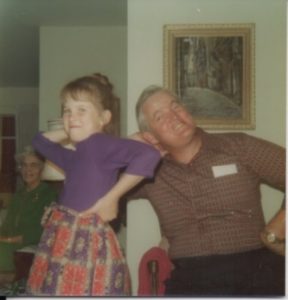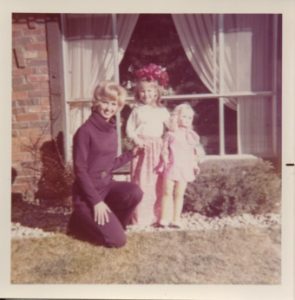 Last week I posted to Facebook that I’d heard that my Uncle Patrick died. It was quite a shock, because we’d been in tenuous contact for the last few years. I knew he was getting older, that he’d retired, but not that things had gotten as bad as they had. The last couple of times I talked to him, he got confused about who I was, mixing me up with the Campbell cousins from Nebraska.
Last week I posted to Facebook that I’d heard that my Uncle Patrick died. It was quite a shock, because we’d been in tenuous contact for the last few years. I knew he was getting older, that he’d retired, but not that things had gotten as bad as they had. The last couple of times I talked to him, he got confused about who I was, mixing me up with the Campbell cousins from Nebraska.
Patrick became my uncle just before my seventh birthday. Many of you know my father died when I was three, my mother widowed at twenty-seven. For a few years, it was just the two of us. Then my mom met and married Leo Kennedy. He was my stepfather for thirty years, until his death in 2003. With Leo, I gained another grandmother, Francie, and my Uncle Patrick and Aunt Jane. I also gained those Nebraska Campbell cousins (Francie’s family) and assorted great-aunts. 
If you’ve read my essay collection, A Report from Driver #3 is about the aftermath of Aunt Jane’s death in 2001. At that time we knew Leo was sick – and I mention it in the essay – but we didn’t expect him to be gone a short two years later. As Francie had passed away while I was in high school, that left Patrick the last of that branch of the Kennedys.
Leo and Patrick had been tremendously close. Leo idolized his older brother and followed his footsteps into the priesthood, though he later left the church. Patrick remained a priest all his life, serving at various parishes around Colorado. He treated me as his own family. My growing up is littered with visits to whatever town he lived in at the time – fishing in Brighton, fiestas in northwest Denver, cross-country skiing in Minturn, near Vail. He attended most holiday dinners at our house. On Christmas and Easter, he would bring the collections from mass, as they were always the largest, and had us help count them to keep his numbers straight. Over those dinners, over many years, he and Leo debated politics, religion and the church. I learned more about Catholicism, both old and new, from the two of them – and also how to argue a point. Or even play devil’s advocate. With a father who died much too young of black lung, they leaned far left. Patrick famously got in trouble with the Archdiocese for his relentless defense of what he felt the church should be doing for the poor.
I once blurted out that they wouldn’t vote for Jesus Christ if he ran as a republican and they agreed that I was absolutely right.
There wasn’t a question of church doctrine Patrick wouldn’t answer for me – even if it reflected badly on the church. With an encyclopedic mind and a lifelong love of learning, he knew the answers, could cite and quote extensively. Patrick and Leo both taught me to understand the difference between the religion and the church, the difference between personal faith and spirituality, and man’s institution on earth. Patrick gave me my first communion in Francie’s living room, but never bothered me about attending church. He lived his faith, embodying compassion.
After Leo died, and my mother remarried a few years later, we saw less and less of Patrick. With my mom living in Tucson half the year, I made it to Denver less frequently. Then even less so when I moved to Santa Fe and when she later sold the Denver house. I sent Patrick Christmas presents, though he never much cared for material possessions, another way he lived his faith. Mostly I gave him subscriptions to Wyoming Wildlife and sent food baskets, as he always loved to eat.
I tried to keep in touch, as Leo would have wanted, but Patrick didn’t seem to need me to. He kept busy with the church and his parish. When he retired to the Catholic Priests Home, they spoke of him with affection when I called. In the end, his mind went, which explained his confusion when I talked with him.
The funeral mass last week was done in grand style at the Cathedral Basilica of the Immaculate Conception in downtown Denver. The Archbishop presided, along with many bishops and priests – many who remembered me from the years. They spoke highly of Patrick, and wryly mentioned his contentious politics. It was a good service.
I don’t remember much about Leo’s funeral. He died much too young, after years of struggling with Progressive Supranuclear Palsy (PSP). His was not an easy or peaceful death and that was a hard time for us. One of those things you bear down and grit through.
Somehow, though, saying goodbye to Patrick felt much like letting go of Leo all over again, too. I wept during the Eucharist, which shouldn’t be emotional, and yet somehow was. The core of faith, that bread and wine become body and blood, that we transform and move on. We say goodbye, but no one is ever truly gone.
May the road rise up to meet you,
May the wind be always at your back,
May the sun shine warm upon your face,
The rains fall soft upon your fields,
And until we meet again,
May God hold you in the palm of His hand.



